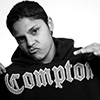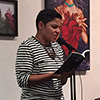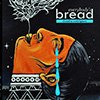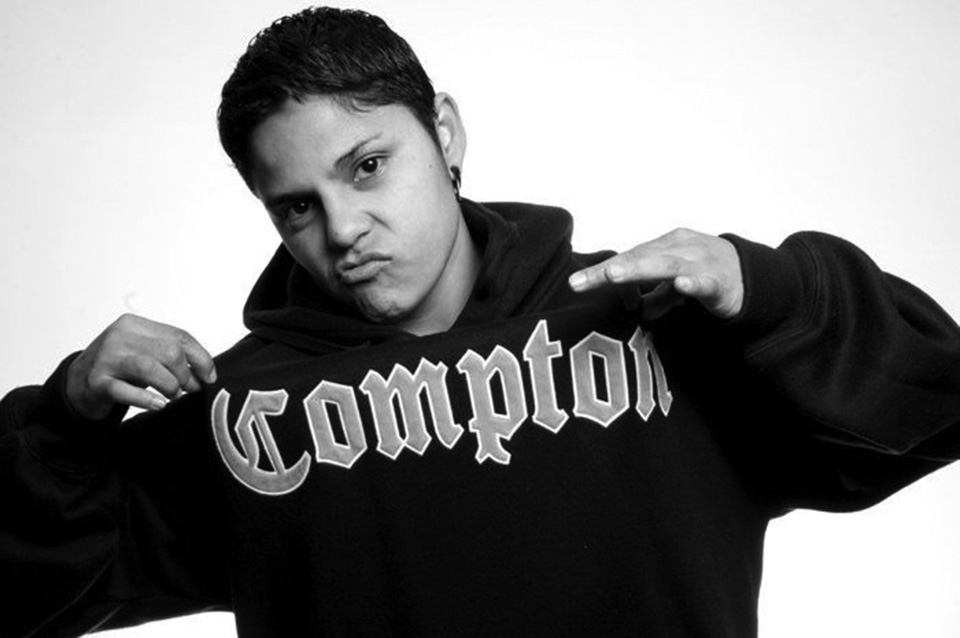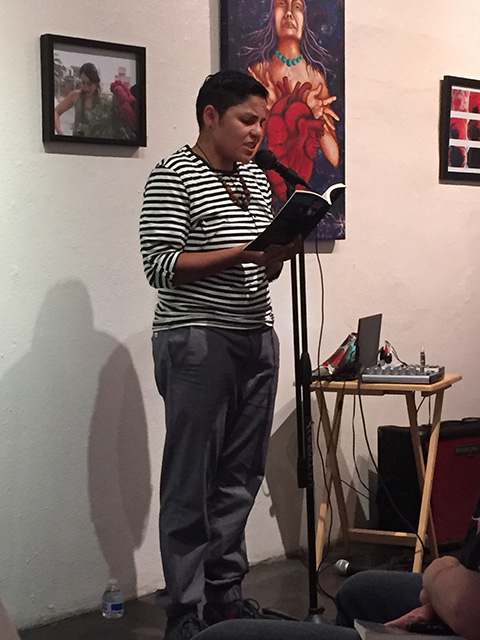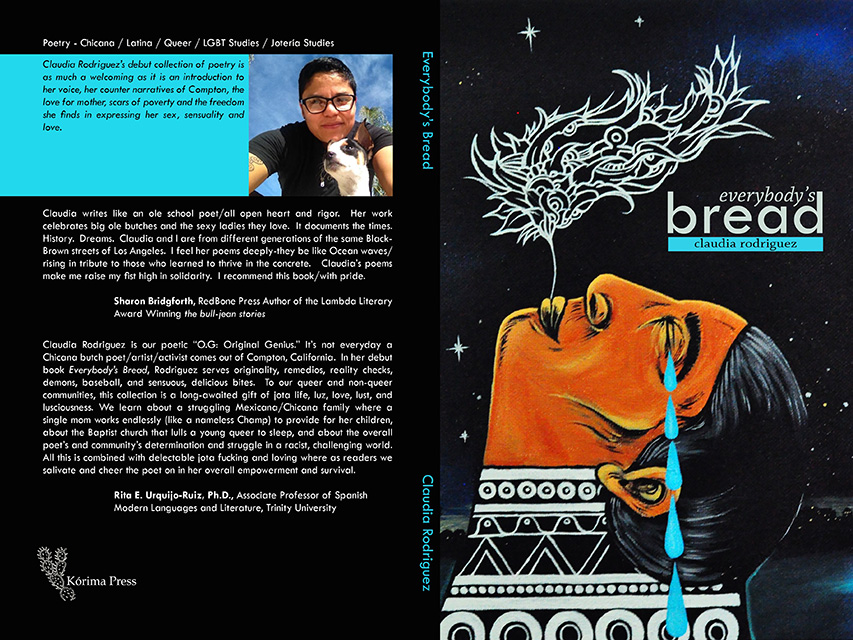Claudia Rodriguez
CLAUDIA RODRIGUEZ: Compton's Poet
Claudia Rodriguez leads and writes with her senses. She tells stories with her senses, invokes desire with her senses, sensationally, sin verguenza, shamelessly. She is a writer, performer, teacher, daughter, mythmaker, healer, lover, and poet—the self-proclaimed poet of Compton, where she was born and raised. She uses words and stories to clean up the mess of boxes, of categories, of limitations. Her poetry and performances, as well as the projects she takes on, create rich cartographies, of bodies, queer and brown, femme and butch, maps of cities, specifically of Compton. In her latest project, Midnight Steel, which she is creating with the help of the C.O.L.A. fellowship, she is bringing together stories of Compton, painting geographies of its sounds, stories, myths, and desires. Her poems are like corridos—old border songs about heroes of the Mexican revolution—but her corridos are odes to immigrant mothers, young queer people, street kids, her old self, all heroes of the black and brown Compton borderlands.
Through words and memories, Rodriguez maps herself—her memories, desires, and dreams—onto the layered literary and performative traditions of queer Chicana writing that have modeled for young Chicanas/os the power of writing, of storytelling, of spilling secrets. Rodriguez's work follows the tradition of queer women of color writing their way into existence, using their words to create bridges, speak truths, make their desires visible and felt. She is a living response to Gloria Anzaldúa's "Speaking in Tongues: A Letter to Third World Women Writers." Anzaldúa writes, "Forget the room of one's own, write in the kitchen, lock yourself up in the bathroom." (1) Rodriguez stands in a long line of L.A. Chicana/o writers that includes Gloria Alvarez, Gil Cuadros, Terri de la Peña, John Rechy, and Helena Maria Viramontes. Like them, she maps out the sensual and intimate terrain of the body and the streets, her literary playgrounds and battlefields. For example, in her work in HIV prevention and with translatinas, Rodriguez has merged her creative abilities with grassroots activism. She stands out as a poeta with piercing words and a gran corazón—she is a bucha unafraid to cry and hold us when we weep.
Rodriguez is not writing for just anyone—only for those who can ride along for the journey. Those who can ride or die! Yet she is also writing for everyone, even the suburban middle-class white mother. How so, we may ask? In 2015 I read from Rodriguez's book Everybody's Bread at an event at the college where I teach. One of my students was there with her mother. The next semester, the student told me that her mom fell in love with the book and that it is now one of her favorites. While staying true to specific themes of immigration, queer identity, Compton, and baseball, through poems like "Home Run Blues" and "American Dreaming," Rodriguez touches on universal aspects of life, proving that poetry, specifically Everybody's Bread, is truly for everybody.
In "My Compton Night," Rodriguez writes: "When are they starting, the sound cues of night time street life? Old faucets, humming of refrigerator, tambourine jingle drums, la noche has a different soundtrack." (2) This poem does not deny the violence and turmoil of her city, but it turns the myth upside down. In the midst of violence and poverty, there is also serenity, peace, and safety in the private moments of memories. Compton is also a repository of love, desire, and family. For me—as a poet, a critic, and like Rodriguez, a child of immigrants—the poems about her mother stand out. They are melodic, visceral odes to immigrant mothers, odes to the laboring hands of those who make L.A. move. Rodriguez maps the city in a tactile manner, through the hands of mujeres cleaning bathrooms, caring for strangers' children; she pays homage to family, to queer familias. She is an L.A. storyteller, Compton’s poet. Through her writing, performance, activism, and teaching, she helps us find sequins in the rubble.
—Eddy Francisco Alvarez Jr.
Notes
1. Gloria Anzaldúa, "Speaking in Tongues: A Letter to Third World Women Writers,"
in This Bridge Called My Back: Writings by Radical Women of Color, ed.
Cherríe Moraga and Gloria Anzaldúa (Albany, NY: SUNY Press, 2015), 255.
2. Claudia Rodriguez, Everybody's Bread (San Francisco: Kórima, 2014), 10.
Claudia Rodriguez
Born 1976, Compton, CA
Lives in East Los Angeles
Education
MFA, creative writing, California Institute of the Arts, Valencia, 2002
Selected Readings and Performances
2016 "Jotas: A Chicana Lesbian Reading by Barrio-Based Writers," AWP Conference, Los Angeles
2016 Reading at Coiled Serpent book launch, hosted by Luis Rodriguez (AWP off-site event)
2015 "Chicana/Latina Masculinities," University of San Francisco (solo reading and lecture)
2015 "Queer Imaginings," Center for Social Justice, University of Nevada, Las Vegas (solo reading)
2015 "Intimacies and Probaditas: Queer Chicana/Latina Writers on Writing, Publishing and
Pushing New Narratives," National Association of Chicano/a Studies, San Francisco (solo reading)
2014 Keynote address and solo poetry reading, UCLA Queer Graduate Student Conference
2011 Assistant director / actor, Outlaws on Stage, Macha Theatre Company, West Hollywood, CA
Selected Bibliography
Hammidi, Tani. "Reasons We Love Butchlalis de Panochtitlan." Curve 17 (June 2007): 96.
Roberts, Erica. "Gangsta Wrap: Theater Diva Hangs with the Urban Latina Performance Activists
Butchlalis de Panochtitlan." Diva Magazine, no. 135 (August 2007): 38.
Tongson, Karen. "The Light That Never Goes Out: Butchlalis de Panochtitlan Reclaim 'Lesser
Los Angeles.'" In Relocations: Queer Suburban Imaginaries, 159–202. New York: New York
University Press, 2011.
Artist's Website:
www.rodriguezwriter.blogspot.com
Selected Poems
Residuum
Our father
who art in heaven...
Is that why you were never home?
Is that where you've been
all these years? In heaven?
Hollowed be my cries
valley of tears in the dark
lonely whispers wishing
you could bring us our daily bread.
Padre nuestro,
el cielo esta tan lejos
y nos cobija
pero me sentía fría.
Padre nuestro, estas en los cielos
y la casa vacía
fría como hielo.
Padre nuestro
who art in heaven
hallowed be thy name.
Efrain!
Am I really still mad at you
or just mad for this trope?
Me pongo fría
en los tiempos difíciles
dura, difícil de traspasar.
Must forgive your trespasses
really, forgive and move on.
Forgive myself
for feeling like I wasn't enough.
Forgive myself for walking around
with a chip on my shoulder
really, I had a chipped shoulder
all that shrugging and sobbing.
I want to deliver me
to me, be full of grace
blessed be all the fruits of my womb.
Our father who are in heaven
do you listen to my prayers?
I rummaged through this shit
so damn much, time to bury
la pinche hacha
at your feet, pin my milagro
on your shirt wear it
a badge of honor—El perdonado.
Glory be to you father
as it was for me in the beginning
but my eyes were not turned
the right way to see...glory
is now and ever shall just be.
Just be.
To my butch scholar
What is Butch aesthetic?
Is it when you reflect what you see before you into words?
If so then you have to talk about my big boobs.
If so then you have to talk about my tight ass
and how you salivate at the thought
of your fingers
sliding up and down your keyboard
as you recreate me, separate me, turn me upside down
and label me.
ME—your idea!
For you to relive every time you, she, I read.
Butch aesthetic?
that captured by your eyes
digested by your mind
and ends up on everyone's tongue.
If you reflect what you see before you into words,
please include the smells.
Is that hot wax or the smell of hot skin?
Shhh listen.
It's your heart beating in MHz at the sound
of the whip against my back,
Um, my moans.
Butch mystique?
that surrounding my butch Papi
who stirs fag/boi/trans fantasies
like you fucking me in your mind
as you witness
gender fucker
fucking
gender fucker
performing Butch identity against what is Queer/Butch.
Gender fuckers gender fucking,
performing Butch identity against what it means to be a chicana/butch
butch violating butch...
This is butch to me...
I feel the marks of my identity
I've been the butch top in this femme-butch matrix
where my desire IS draped in femme fatigues
where my identity manipulates my desires
where I've been somebody's bitch
Really, I just want to be ok with wanting to be manipulated by you.
Feeling your cock-hard Domness
makes my cock hard
femme or butch both can top me the same
as long as I get spanked the way I like to be spanked.
The personal is political
but the political is not always written on the skin
I know you see me as a cabron ladies...don't deny it
can you tell I like to fuck boys/bois?
Yes
I am
one of those butches that flew over the coo-coo's nest
the kind that fucks other butchas.
Go ahead and say it "where are all the real butches."
Act surprised that I'm really down with getting down butch on butch?
Hola Papi,
I was thinking about you, how the other day you stretched yourself out before me, slid
your hand under your boxers and touched yourself. You scooped some of your juice up! I
know cause I saw as you first smelled your scent then ate it.
As if nothing you slid your hand down there again. You face twisted this way and that with
pleasure and lips parted with your moans. You got the legs twitching, chest heaving
types of motions. I watched until your eyes rolled to the back of your head with
satisfaction and closed with bliss.
Here I go again
Talking all that little boy fetish
I like short hair,
peach fuzzed, tittie tottin' cara de niño
The prettier the better
I'll say it
Son mi cochinita pibil
Carne tierna y picosa.
Won't I ever quit
Shed this skin
Step into the post pony-tail dyke
Post-drag king
Post-andro
Post-trans
Post post
Post Pomo
all I want is to step into my post-heroic masculinity
Stop suppressing mine to uphold others'
Does it make you feel good?
Does it heave your imaginary man pecks
to put me down? To walk around me like everything is cool
even though you don't play by the rules,
Then I'm down to let you
If you think you're Top enough to top this.
Reflect what you see before you into words...
Gang-boys
A tree marked
with a giant 7
and a giant 0
The 70's came through here.
A stop sign tagged with T-Flats
no longer stops traffic
but serves to warn you
intruder
that you’re entering
Tortilla Flat territory.
Better yield.
I lived in the middle of gangs
sandwiched between
deadly loyalties
to the red, blue, the brown.
My childhood riddled
with gang-boys
who think, believe they are men
but each one
really a man-child.
Sagging pants
weighed down
by the gats they tote.
Glock, revolver in one pocket
bandana representing in the other.
Sporting perfectly pressed
blinding bright white t's
cut-off dark work pants
with creases cutting the air,
hair shiny, sleek
classic like the filero,
thick white sport socks pulled knee-high
and dark knit gloves in the summer!
I knew some of them
talked and laughed with them
I wasn't
allowed to befriend them
not allowed to cross
their path to nowhere good.
Willie, aka Will or Big Slim
with his pet iguana
and his magnetic smile
couldn't help but want to talk to him
or have him talk to you.
Always very friendly and funny
but fled to the 'burbs
to get away from the life—
to save his life.
Either on foot,
covered in thick Nike Cortez,
or on bikes
these lost boys
left their trail
of graffiti, fear and loathing.
To see them was to know
they'd lose their life
they'd lose the street battle
leaving loved ones
the community
the city
to continue
living the war.
A war they can't see from their graves
or the luckier ones, from their cells.
A war
fueled by the push and pull
of la pandilla, la clica, the "set"
with its utter freedom
to roam the streets, incite fear
break the rules,
break faces,
break the bank with their street hustle
gives a young boy
a dose of "manhood" to the head.
To be manly and supported in that
to be protected by your brothers in that.
How cool to be "cool" for all the girls.
Cause, who doesn’t love a bad boy (even secretly)?
Those gang-boys
who think, believe they are men
but each one
really a man-child
pushed by tradition,
cause Smiley
has Baby Smiley and Lil Smiley
looking up to big tough tatted dad.
Pushed by threats,
pushed into throwing down,
blow by blow
dying block by block.
Sacrificing their lives
disrespecting that of their enemy's
representing their hood hard
just to be worthy of respect.
In the end
after all the fundraising:
car washes
knocking on my door collecting funds
to bury her fallen son
"Here, here is a $5, I don’t want
to see anymore pictures of him,"
can't look at her bloodshot eyes
After all the R.I.Ps have been sewn
sprayed on, etched on
to car windows, t-shirts, caps
sweatshirts and tattooed on
brown and black skin
After all this
who thinks about
respect?
Who thinks of the boy's set?
Just a lonely painful
memory, relived
of how a gang-boy
who thought, believed he was a man
was really a child.
Gang Boys, published in Pomona Valley Review: A Journal of Liberal Arts, 6 (2012)


